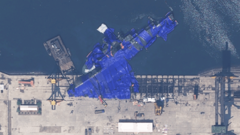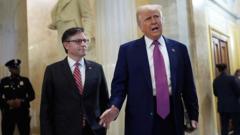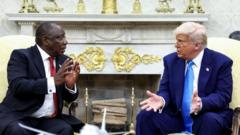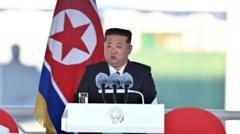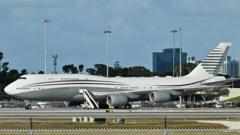While the US maintains extensive sanctions against Russia, the decision not to impose additional tariffs prompts a range of interpretations in both the US and Russian media spheres.
**Trump's Tariff Announcement Omits Russia, Sparking Mixed Reactions**

**Trump's Tariff Announcement Omits Russia, Sparking Mixed Reactions**
The absence of Russia from Trump's latest tariff list raises eyebrows in the West and draws commentary from various media outlets.
Despite previous tension and sanctions following Russia's 2022 invasion of Ukraine, former President Donald Trump's recent tariff list surprisingly excluded Russia, a fact that has been met with disappointment in Western regions. Citing White House Press Secretary Karoline Leavitt, reports indicate that existing US sanctions sufficiently limit trade with Russia, leading to its omission, unlike nations such as Syria, which engage in lesser trade dealings. Tariffs were also not aimed at Cuba, Belarus, and North Korea for similar reasons.
While the US has historically had a complicated relationship with Russia, Trump’s approach since resuming office appears more conciliatory. His administration has made it a priority to end the ongoing war in Ukraine. Recently, Trump hinted at imposing a hefty 50% tariff on nations purchasing Russian oil unless a ceasefire with President Vladimir Putin is negotiated, indicating he is willing to leverage economic strategies during peace discussions.
The narrative from Russian media suggests that while no tariffs have been placed on Russia, it is not due to favorable treatment. State-controlled media, including Rossiya 24 TV, concurs that sanctions shape current trade dynamics, with the absence of tariffs merely a reflection of these broader restrictions. The commercial trade between Russia and the US was valued at around $3.5 billion, predominantly in fertilizers and metals, as of 2024.
Some Russian authorities took a mocking stance on the new tariff list, focusing on minor inclusions like uninhabited territories. The sentiment from Kremlin-affiliated channels portrays Trump’s tariff stance as demeaning to European allies.
Meanwhile, Ukraine faces potential negative impacts from a 10% tariff on its exports to the US. Ukrainian Deputy Prime Minister Yulia Svyrydenko expressed concern that small producers would be the hardest hit and emphasized the need for better negotiating terms, framing Ukraine as a key ally to the US amidst ongoing military support in their conflict with Russia.
The discussion surrounding Trump's tariff omissions not only highlights the intricate geopolitical dynamics at play but also exemplifies the intricate interplay between economic measures and international relations in today's context.
While the US has historically had a complicated relationship with Russia, Trump’s approach since resuming office appears more conciliatory. His administration has made it a priority to end the ongoing war in Ukraine. Recently, Trump hinted at imposing a hefty 50% tariff on nations purchasing Russian oil unless a ceasefire with President Vladimir Putin is negotiated, indicating he is willing to leverage economic strategies during peace discussions.
The narrative from Russian media suggests that while no tariffs have been placed on Russia, it is not due to favorable treatment. State-controlled media, including Rossiya 24 TV, concurs that sanctions shape current trade dynamics, with the absence of tariffs merely a reflection of these broader restrictions. The commercial trade between Russia and the US was valued at around $3.5 billion, predominantly in fertilizers and metals, as of 2024.
Some Russian authorities took a mocking stance on the new tariff list, focusing on minor inclusions like uninhabited territories. The sentiment from Kremlin-affiliated channels portrays Trump’s tariff stance as demeaning to European allies.
Meanwhile, Ukraine faces potential negative impacts from a 10% tariff on its exports to the US. Ukrainian Deputy Prime Minister Yulia Svyrydenko expressed concern that small producers would be the hardest hit and emphasized the need for better negotiating terms, framing Ukraine as a key ally to the US amidst ongoing military support in their conflict with Russia.
The discussion surrounding Trump's tariff omissions not only highlights the intricate geopolitical dynamics at play but also exemplifies the intricate interplay between economic measures and international relations in today's context.


